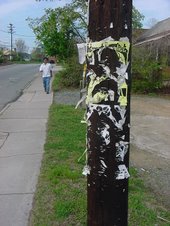
The Chapel Hill News
April 21, 2002
Page A1
By Frank Heath
My friend Erik Ose visited me with a petition this week. Ose, who owns Lost City Music and Video on Rosemary Street, was given a citation recently for hanging flyers on a utility pole in downtown Chapel Hill. His petition will ask the Town Council to consider changing the ordinance that prohibits the posting of handbills on utility poles in Chapel Hill.
April 21, 2002
Page A1
By Frank Heath
My friend Erik Ose visited me with a petition this week. Ose, who owns Lost City Music and Video on Rosemary Street, was given a citation recently for hanging flyers on a utility pole in downtown Chapel Hill. His petition will ask the Town Council to consider changing the ordinance that prohibits the posting of handbills on utility poles in Chapel Hill.
In a statement accompanying this petition, Erik points out the futility of the ordinance when he says, "I could have simply done what everyone else they've ever caught in the act of postering on telephone poles does, namely, torn my own posters down, apologize, and go on to the next corner to put up more posters once the officers' backs were turned. Citizens put flyers up on utility poles every day, and they're going to keep doing it, unless there's a cop on every corner ready to arrest them."
In the end, tearing flyers off utility poles in this town only reveals the even uglier utility poles.
Truth be told, I never envisioned the time that I would stand on a soap box preaching about flyers. In a world where people are blowing themselves up for what they believe, I know that the business of posting handbills is truly a trivial pursuit. But since Ose brought it up -- and produced such a persuasive petition -- I thought I'd throw in my two cents.
If I am an expert on one thing, it's hanging flyers. I've been "flyering" in Chapel Hill since 1986. I've probably affixed half a million flyers and posters to bulletin boards, walls, newspaper boxes, kiosks, fences, trucks and, yes, utility poles, around the Triangle area.
I've actually received citations in Raleigh and Durham for posting on telephone poles. They call it "littering."
Many people see flyers as a blight on the landscape. I completely understand where these people are coming from. Flyers are not always neatly displayed, they can be distracting, they flap in the wind, they get wet, the colors run and they fall to the ground.
Some people, though, see flyers as beautiful and informative, a manifestation of social energy. To these folks, an abundance of flyers in public areas is a sign of public vitality, an indication that there are layers of activity beneath the surface of a place.
Flyers convey a message with impact and immediacy. Like a well-built house, a good flyer combines elements of design, color, message and art into an integrated whole.
Bulletin boards, kiosks and other flyer-posting spots in areas of pedestrian traffic provide an outlet for exchange of information and ideas about local organizations, events and meetings. Flyering also presents small local businesses with an alternative to expensive advertising campaigns.
I believe it's good to bring up flyering at this point in time because for several years now the base of support for public postings has been shrinking in Chapel Hill. As the number of flyer kiosks downtown has dwindled from five to two (and I doubt the kiosk in front of Subway will last through the next phase of Streetscape), some of the town's vitality has been lost.
Additionally, flyers are no longer allowed in many of the restaurants and businesses that traditionally provided wall space for them. (The Yogurt Pump, Hectors, Brueggers, Traxx, the Flying Burrito and the Harris Teeter supermarkets are some examples of this trend toward bare walls.)
On top of that, the number of bulletin boards on the UNC campus has dropped significantly, and the dormitories, now locked up 24 hours a day, are no longer a flyering option. A round of flyering that once would have taken six to eight hours per week, now requires no more than three hours.
The bottom line is, the prevailing wind here seems to be blowing away from favoring posters and other spontaneous communication forms -- and toward neatly trimmed hedges and arrow-straight, clean-washed brick sidewalks. Messages, it seems, may soon only be popping up on your computer screen. (My friend Groves, a fellow posterer, calls Streetscape the "downtown uglification.") In supporting his petition, Ose cuts to the chase when he says, "I think the council needs to take a hard look at whether speech is truly free if it's restricted to one or two little areas in town."
I can't help but draw a parallel between this dwindling support for handbills and the current climate of federal paranoia about speech in this entire country.
As far as I'm concerned, the people of Chapel Hill should be defiantly proud that Jesse Helms once suggested we put a fence around this town and call it the North Carolina Zoo; and we should be proud of the fact that we share space and ideas with the most progressive state university in the South.
The way I look at it, if progressive thought ain't happening here, it ain't happening.
Shouldn't Chapel Hill, of all places, attempt to foster an environment where all people feel free to speak their mind, rather than a Cary-style neatness?
Free the telephone poles, I say.
Frank Heath is a native Chapel Hillian and a local businessman. Messages for him can be sent to frank@catscradle.com or left at 932-2019.

No comments:
Post a Comment